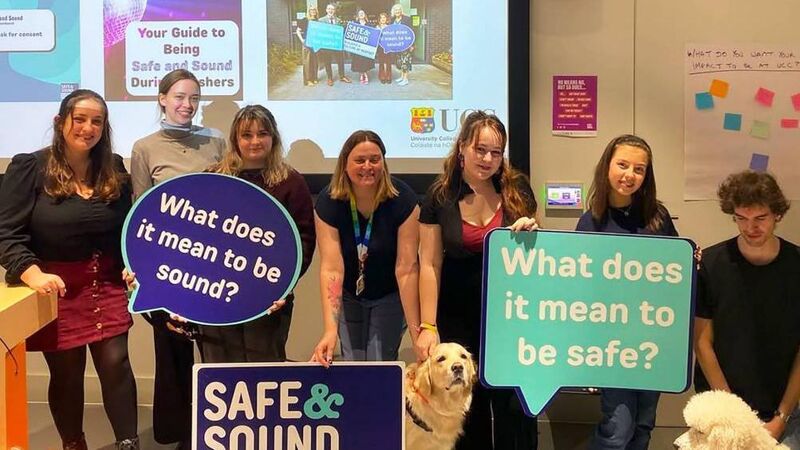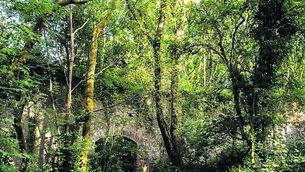Cork Views: Why UCC’s Bystander Intervention programme is so vital

Participants in the UCC Bystander Intervention programme
Every single day, abusive behaviour, subtle remarks and gender expectations are normalised in all of our lives. We let seemingly harmless jokes and actions slide in our day to day. Then, when it comes to interjecting when we witness sexual violence, we often don’t know what to do.
As a college student in UCC and a passionate feminist, it’s so important to me that I can support other women and have a toolkit of mechanisms with which to help other people feel safer. This is exactly what the Bystander Intervention programme seeks to do.
Often, we envisage sexual violence as involving force and being extremely aggressive. Whilst this can be true, more often that not - it’s a far less forceful and violent picture.
It has also been proven that many young people don’t know what the terms sexual assault, rape and consent actually are due to inconsistent teaching of our relationships and sexuality education in schools around the country. If we don’t fully understand, as a society, what the issue even is - how can we be active bystanders? We need to be equipped with the knowledge of what harassment can look like - psychologically, in the eyes of the law, interpersonally, and so forth, if we can ever aim to end this devastating violence.
That’s where the Bystander Intervention Programme starts. By dispelling rape myths and breaking down what the issue actually is first, they then go on to explain ways that we can be active players in preventing harassment and violence.
For example, people many not realise 62% of women are raped by a person known to them and, according to the CSO, 78% of those who experienced sexual violence knew the perpetrator. Also, victims are more likely to freeze or have a fawn response due to shock or trying not to aggravate the perpetrator any further.
According to psychotherapist Pete Walker, ‘fawn’ is “a response to a threat by becoming more appealing to the threat,” and trying to protect themselves from worse harm.
Even more surprising, is the fact the public often don’t fully know what consensual sex or, on the flipside, rape is.
A University of Galway survey of 613 secondary students in 2021 found a fifth thought consent was not always needed before touching breasts, genitals, oral sex, or sexual intercourse. To clarify, the most recent definition of consent is ‘a person consents to a sexual act if he or she freely, voluntarily agrees to engage in that act’, which is a high, positive threshold.
We need to understand sexual violence sits on a pyramid or a spectrum. At the very base is the patriarchy, a system that creates a certain view and expectation of women and allows gender-based violence to manifest and continue. A step up from this are sexist remarks and comments such as rape myths and jokes that are stepping stones to even more harmful behaviour as we progress up the pyramid, such as pressure, non-consensual touching, harassment, manipulation and rape.
As surmised by Dr Catherine O’Sullivan in one of my criminal law lectures this semester: “Rape jokes can only be funny in a society where sexual autonomy is not valued.”
With this pyramid in mind, we can be active bystanders in far more situations than we often at first think. The programme aims to show you how to take action, not to burden you - but to empower you to be a part of the solution.
We can firstly unlearn sexist language and avoid behaviour at the bottom of the pyramid. Likewise, if you see or hear sexism - challenge it or call that person in, ask them what they mean by it and try to educate them on the consequences of their comment or action.
If we’re aware of the ways violence can occur, we can be active bystanders in more serious scenarios. For example, making sure you know where friends are on a night out or standing with someone as they await a taxi. It’s not always safe to directly intervene and throw yourself in between, but you could delegate and ask friends, a bartender or authority for help.
Sometimes, the simplest actions can be the most effective such as causing a distraction by asking for directions or sparking up a conversation with the person who appears at risk.
Finally, it’s really helpful to check in with a person after an incident. Providing support, reassurance and a sense of safety is a hugely important step as an active bystander. You may think your actions alone are meaningless but if more people commit to taking on the role of being active bystanders, we could begin to end the culture of sexual violence.
I first heard of the Bystander Intervention programme in UCC on orientation day last September. It forms part of a strategic response to the issues of sexual misconduct and violence among students and is led by Professor Louise Crowley of the School of Law, UCC.
As a young person embarking on living alone and spending more time socialising, I wanted to learn more about my personal responsibility and how I could help. So, I completed the programme and achieved the Bystander Intervention Digital Badge. I could not recommend the course enough!
The different approaches to learning, via workshops, videos, articles, etc, make the information really accessible and practicable.
I joined the UCC Sound Squad and accepted a place on the PLAN Youth Advisory Panel, and genuinely can say with confidence the awareness I got from it is something I put into action and carry with me every day.
However, Bystander Intervention isn’t just relevant for students. We need to start creating a zero tolerance around sexual hostility on and off campus - amongst all age groups. For example, in the office Bystander Intervention Training is so important as workplace culture is not built by policies and procedures on their own – it is shaped by the actions taken every day by senior leaders and employees.
Jennifer Cashman, Partner and Head of Employment Group at RDJ LLP, shared her perspective on how this approach can better our wider society. “Where there are active bystanders, who stand up for respect, dignity and inclusivity in the workplace, through appropriate bystander intervention, then the organisation will create an environment where everyone will feel valued and empowered to thrive.”
Everyone can be an active bystander, it’s something you learn more about, practise and get better at over time, but the most important aspect of this initiative is that you make a clear commitment to ending sexual misconduct and violence in any way you can. Collectively, that choice equips us with the strength to create a safer world going forward







 App?
App?




